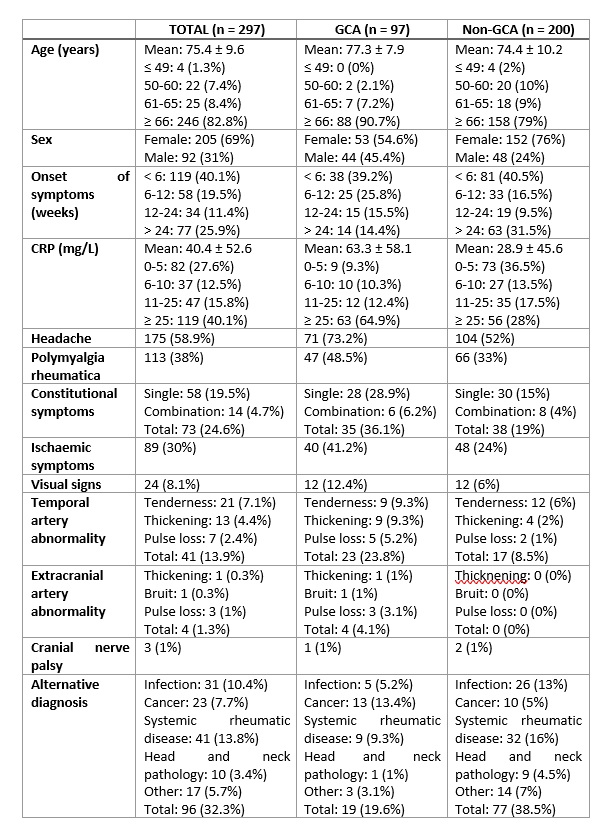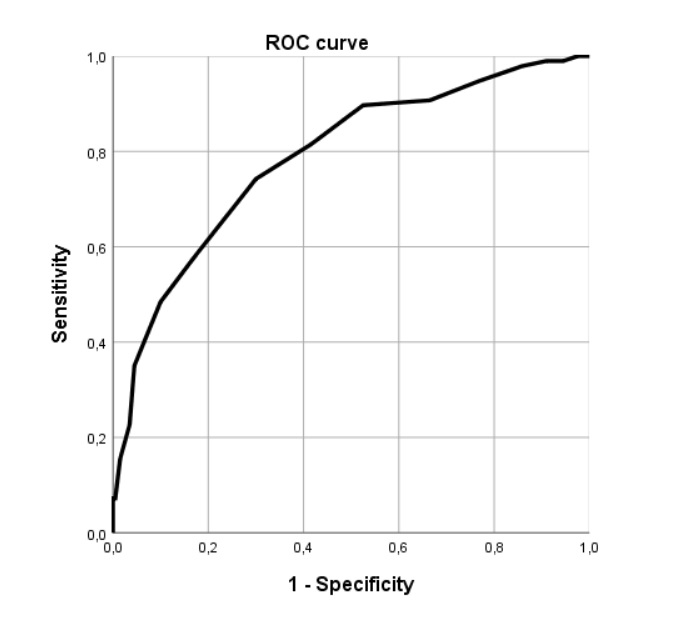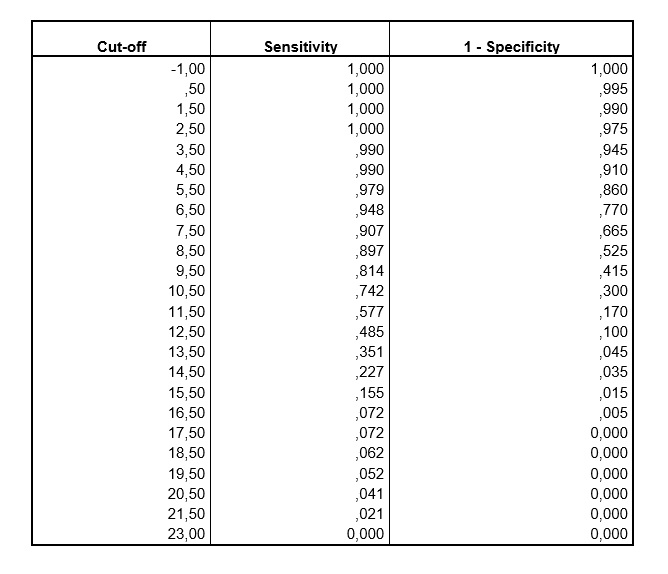Session Information
Date: Monday, November 8, 2021
Session Type: Poster Session C
Session Time: 8:30AM-10:30AM
Background/Purpose: The implementation of fast track clinics (FTC) has enabled quick diagnosis and reduced the blindness rate of giant cell arteritis (GCA). Recently, the Southend Pre Test Probability Score (SPTPS) has been proposed, which allows establishing a probability of having GCA and validating the results of imaging before deciding to perform other diagnostic tests. Since this score has only been tested in the cohort from which it originated, we believe that it should be validated in other populations. The objective is to evaluate the validity of the SPTPS and its usefulness in our population.
Methods: Demographic, clinical and laboratory data of the patients referred to the GCA-FTC of La Paz University Hospital (Madrid, Spain) between 2016 and 2020 were retrospectively collected. Those for which insufficient data were available were excluded. SPTPS was calculated in all included patients. All had undergone color Doppler ultrasound (CDUS) of the temporal arteries and large vessels (axillary, subclavian and carotid arteries). The definitive diagnosis was established according to the physician’s criteria, based on clinical features, CDUS -and other imaging tests or biopsy according to physician criteria- and evolution, after a minimum follow-up of 6 months. The quartiles to stratify the risk of GCA, the ROC curve and the validity of the SPTPS in our cohort were calculated.
Results: A total of 297 patients were included, of which 97 (32.7%) were diagnosed with GCA. Their characteristics are shown in table 1. The mean value of SPTPS was 9.9 ± 3.6 and it area under the curve 0.787 (95% confidence interval: 0.731-0.843) (image 1). The mean SPTPS in the GCA group was 12.4 ± 3.6 and 8.7 ± 3.1 in the non-GCA group (p < 0.005). The SPTPS results showed a value of 10 at the 50th percentile and 12 at the 75th percentile. Therefore, we classified as low risk (LR) the value of SPTPS < 10, intermediate risk (IR) 10-12, and high risk (HR) > 12. The category of HR included 47 patients with GCA (48.5%) and only 20 non-GCA patients (10%), showing a specificity of 90%, sensitivity 48.4%, positive predictive value (PPV) 70% and negative predictive value (NPV) 78%. The IR category included 32 patients with GCA (33%) and 63 non-GCA (31.5%) (specificity 68.5-83%). And the LR category, 18 with GCA (18.5%) and 117 non-GCA (58.5%). A SPTPS ≥ 10 (that is, IR or RA), showed a sensitivity of 81.4%, specificity of 58.5% and NPV of 86.6%. The cut-off ≥7 (equivalent to p25) showed a sensitivity of 95% and a NPV of 90%, while the cut-off ≥14 had a specificity of 95.5% (table 2). There were 51 cases with a score < 7, of which 5 had GCA; the majority had a pattern of extracranial involvement (3 out of 5), which represented 20% of all cases with this pattern. Despite this trend, no statistically significant differences were observed in the SPTPS value between the different patterns of involvement (cranial, mixed, extracranial).
Conclusion: The SPTPS is useful to stratify patients referred to GCA-FTC. A score ≥14 is associated with a very high probability of having GCA and a value < 7 with a very low probability. However, although there were no statistically significant differences, 20% of the patients with extracranial GCA had an SPTPS < 7, so this test may not be able to discriminate well this subtype of the disease.
 Table 1. Demographic, clinical and laboratory characteristics included in the SPTPS of the patients in our cohort.
Table 1. Demographic, clinical and laboratory characteristics included in the SPTPS of the patients in our cohort.
 Image 1. SPTPS ROC curve in our population
Image 1. SPTPS ROC curve in our population
 Table 2. Sensitivity and specificity of the different SPTPS cut-off points in our cohort
Table 2. Sensitivity and specificity of the different SPTPS cut-off points in our cohort
To cite this abstract in AMA style:
Fernández-Fernández E, Monjo I, De Miguel E. Utility and Validity of the Southend Pretest Probability Score (SPTPS) in a Giant Cell Arteritis Fast Track Clinic: Analysis in a Spanish Cohort of 297 Patients [abstract]. Arthritis Rheumatol. 2021; 73 (suppl 9). https://acrabstracts.org/abstract/utility-and-validity-of-the-southend-pretest-probability-score-sptps-in-a-giant-cell-arteritis-fast-track-clinic-analysis-in-a-spanish-cohort-of-297-patients/. Accessed .« Back to ACR Convergence 2021
ACR Meeting Abstracts - https://acrabstracts.org/abstract/utility-and-validity-of-the-southend-pretest-probability-score-sptps-in-a-giant-cell-arteritis-fast-track-clinic-analysis-in-a-spanish-cohort-of-297-patients/
